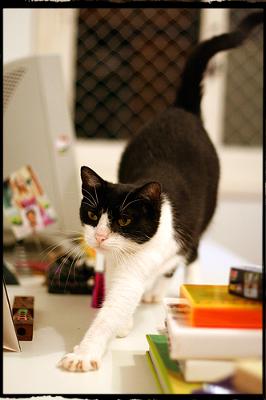Cats Help Us
by Michael
(London, UK)

This is Vic - I would call her "Zorro". Zorro helped people. Cats help us. Great cat and photo by fofurasfelinas (Flickr)
Cats help us in many ways despite the fact that for many outsiders cats are thought to have "no use". People historically consider dogs utilitarian, which is why they were domesticated long before the wild cat. People who are unaware of the cat's role in the lives of people, sometimes think of the cat in derogatory ways. I have a page on the Blogger site (associated with this site) in which I discuss people who hate cats. Lots of people have made comments. I don't read them as it just makes me sad and mad! Although some are positive. See i hate cats![]() . I am sorry to say that a lot of it is born out of pure ignorance.
. I am sorry to say that a lot of it is born out of pure ignorance.
For those people who are cat caretakers, there is no doubt that the relationship is mutual and balanced, which begs the question as to whether "cat caretaker" or "cat keeper", but the usual "cat owner" is an accurate description. There are situations when our cat(s) look after us even though it might not be direct and obvious.
I am thinking of the many wonderful (and some very emotional) stories on this site written by visitors about the saving and caretaking of feral cats. Of course, the articles are written from the standpoint of the person and the subject matter is the feral or stray cat. What if the cat could write an article? We would be the subject matter and we would understand how much we gain and rejoice in our companionship with the humble, tamed feral cat. It would remind us as to how cats help us. Just their presence is enough. There are many moments during which we receive more. I have just combed my old lady with a flea comb before giving her a tasty bit of her favorite meal - fish. She kissed and kissed me on the face. Just making her happy makes me happy. There, right away, is one, immediate, benefit to me.
The pleasure in helping a scrawny, starving, stray or feral cat brings special rewards. In helping and seeing a cat gain confidence and becoming healthy we gain hugely in that process. It feeds our emotions and gives us purpose.
However, there are occasions when cats help us in direct ways. Here are some examples.
Most of us have heard how cats can slow us down, lower our blood pressure and lift depression. The cat's purr can do a bit extra apparently.
The purring of the average house cat is in the frequency range of 25 to 40 cycles per second (Hz). Research indicates that when humans are exposed to frequencies of 20 - 50 Hz sound (air vibrations) there are real benefits. This frequency induces increased bone density, the healing of muscles and tendons and the relief of pain1. It is said to provide relief to migraine sufferers.
Carol Smith living in Maine, USA recounts an interesting story that echoes the well known stories of Oscar, the hospice cat who predicts when a patient is dying and goes to them.
Carol was, it seems, somewhat of a workaholic. She spotted two cats on a beach road (lots of cats are found near roads it seems). They were emaciated. She asked about them but received inconclusive reports. She scooped them up and took them home. What else can you do! She named the mother, Molly and her daughter, Miss Minnie (because she was small - what else..again).
The cats thrived under Carol's care. Molly was outgoing and Miss Minnie not. Molly began to behave strangely. She kept on waking Carol up in the dead of night by walking over her or tickling her with her whiskers. When she woke she found her heart was racing. Carol went to a specialist who diagnosed a heart condition. He prescribed medication and her heart rhythms returned to a more acceptable pattern as evidenced by the fact that Molly didn't wake her up any more!
The years rolled by. Carol's heart deteriorated again. This time it was Miss Minnie's turn to watch over her. From being a bit aloof she started to awaken Carol in exactly the same way as her mother. Miss Minnie stayed on the bed all night. This was the new routine.
Carol eventually discovered the state of her heart condition - poor. In hospital (
for tests I presume) she was deliberately woken by nurses throughout the night mimicing exacty what Molly and Miss Minnie had been doing for years. Carol scratched her head.
Subsequently a heart monitor indicated that her heart routinely stopped several times during the night for eight seconds at a time. The consultant that she was seeing at the time explained that Molly and Miss Minnie had been acting as pacemakers. Waking her up kick started the heart or made the heart work. Sleeping appears to have been the danger time and her cats knew this.
Ironically Molly died of a heart condition and died in her sleep - a painful loss for Carol.
This is a special, inexplicable (to us) story. But the great untold story that unfolds a millions times each day across the world is the gentle almost imperceptible support that cats give to us by their presence and behavior.
![]()
Cats Help Us -- Sources:
1. Elizabeth von Muggenthaler - Fauna Communications Research Institute North Carolina - Angel Cats by Allen & Linda Anderson

